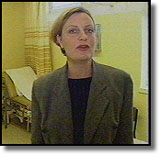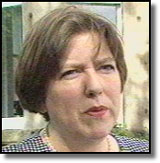
Health and a Scottish Parliament

|
| Pennie Taylor: Health Correspondent |
- Some facts:
- The health budget in Scotland amounts to £4.26 billion.
- 52,000 nurses and 10,500 doctors are employed in the sector.
In hospitals accross Scotland, there is a similar problem - full waiting rooms with staff battling to cope. Despite past efforts, there is no sign of demand for treatment falling. It is proposed a Scottish parliament would achieve that by targeting the root causes of ill health - by improving housing and diet and addressing poverty. Do voters in Scotland think that this is achievable?
The majority of people I spoke to in a hospital in central Glasgow believe that Scotland's health would be better looked after under a Scottish parliament. One nurse said "Seeing things first-hand, seeing how things are lacking, obviously that's making me feel we can do a better job on our own." A man in the waiting room complained: "You cannae have a healthy society where you've got subserviance to a foreign country."

|
| June Andrews: MPs can be on the scene quicker |
It is proposed a Scottish parliament would take a fresh look at difficulties and come up with better ways of using the health budget. Doctors say there are clear priorities, for instance, community care. Dr John Garner, British Medical Association: "There is a lot of debate between health and social workers as to where one's responsibility begins and another's ends. If there was a unified budget, there would perhaps be opportunities for ensuring that seamless care, that we all talk about, continuing and actually benefiting the populous."
What changes do Scotland's patients want to see? Patricia Dawson, Scottish association of Health Councils: "We would certainly be looking for issues of accountability, greater openness, greater involvement of the public in the decision-making around health, and greater involvement of patients in determining and planning for their own health care."

|
| Scotland: more money per patient than England |
For all the potential opportunities devolution offers the health service, there are potential problems. Health professionals wouldn't want to see different pay scales north of the Border. What about the fact that Scotland trains many more doctors than it uses? Whatever the outcome on September 11, those who work in the health service in Scotland say they'd welcome the chance to debate its future.


